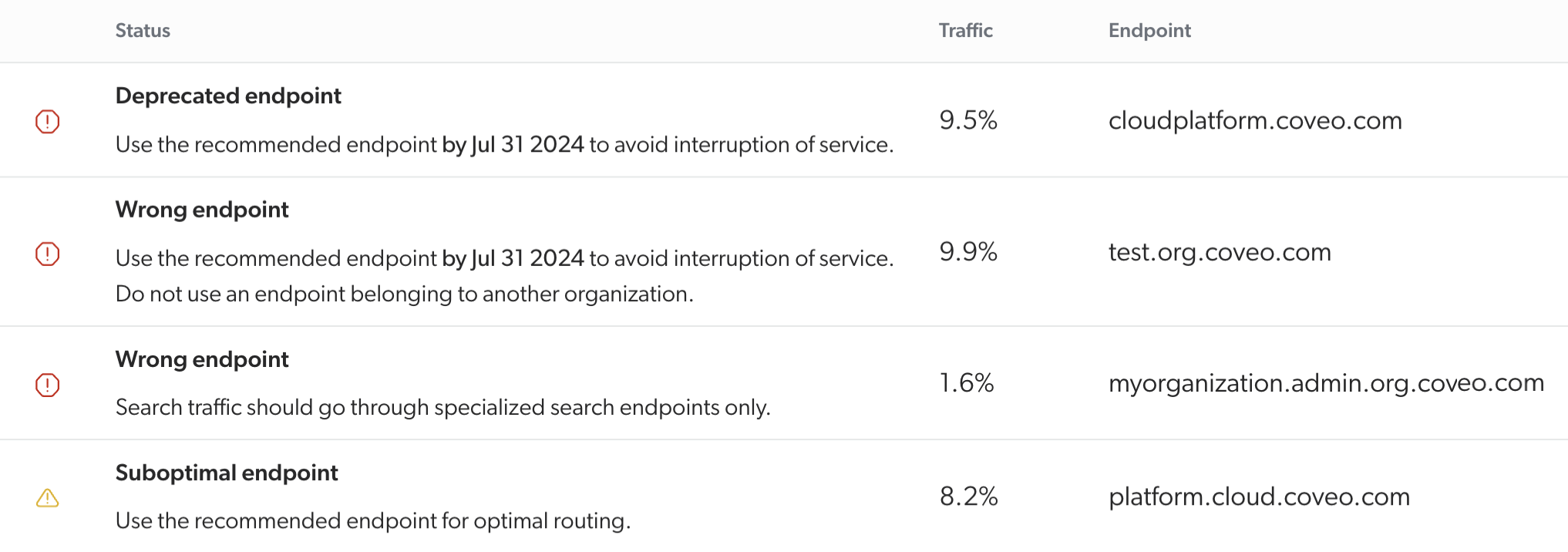Endpoint deprecation and other endpoint-related changes
Endpoint deprecation and other endpoint-related changes
Coveo initially went live into the cloud ten years ago. Since then, technology and practices evolved greatly.
As a result, to simplify the use and future development of its platform while still providing the same world-class service, Coveo will do the following on December 9, 2024:
-
Deprecate the Coveo V1 platform endpoint (
cloudplatform.coveo.com). -
Deprecate the Coveo V1 usage analytics endpoint (
usageanalytics.coveo.com). -
Force incoming requests to target the organization associated with the organization-specific endpoint used. For example, a query targeting organization
myproductionorgsent tomysandboxorg.org.coveo.comwill be blocked because it’s incoherent, while the same query viamyproductionorg.org.coveo.comwill be allowed. -
Block analytics-logging calls made towards search (
<ORG_ID>.org.coveo.com/*) and administration (<ORG_ID>.admin.org.coveo.com/*) endpoints. -
Block search requests made to the analytics logging (
<ORG_ID>.analytics.org.coveo.com/*) endpoints.
For details on the Coveo endpoints, see Deployment regions and strategies and Organization endpoints.
Benefits
These changes will make it easier for Coveo to maintain its infrastructure in the future.
In addition, thanks to its new organization-specific endpoints (<orgid>.org.coveo.com), Coveo can handle traffic to your organization in a very targeted fashion.
Should an issue with your organization’s traffic ever arise, Coveo will be able to handle it more efficiently.
Do these changes impact my organization?
|
|
Using the Coveo for Sitecore integration?
Refer to usageanalytics.coveo.com endpoint deprecation for more specific information. |
Your organization is impacted if it does at least one of the following:
-
It still targets old Coveo V1 endpoints (
cloudplatform.coveo.comandusageanalytics.coveo.com). You can review the endpoints in use in your organization settings, under Traffic (platform-ca | platform-eu | platform-au).
-
It misuses its organization-specific endpoints in ways such as:
-
Multiple organizations using the same endpoint rather than each organization using its unique endpoint.
-
Making calls to a non-production organization using a production organization’s endpoint, and vice versa.
-
-
It makes analytics-logging calls to search or administration endpoints, or search requests to analytics endpoints.
Next steps
The Coveo team has been reviewing traffic data to determine whether these changes affect your organization. If so, your Coveo representative will contact you shortly to help you update your implementation.
However, since it’s not possible for Coveo to review your code and rule out completely the possibility of an impact, we highly recommend that you check yourself that your Coveo implementation:
-
Doesn’t use any of the endpoints being deprecated (
cloudplatform.coveo.comandusageanalytics.coveo.com). You can review whether these endpoints receive any traffic in the Traffic (platform-ca | platform-eu | platform-au) panel. -
Properly uses its organization-specific endpoints.
If you have any questions, contact your Coveo representative.